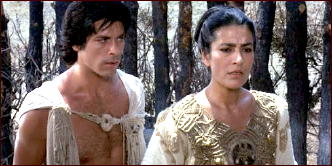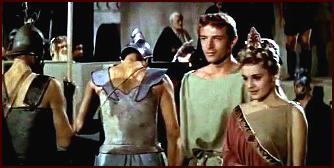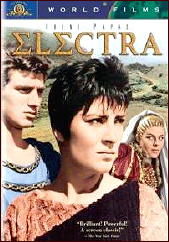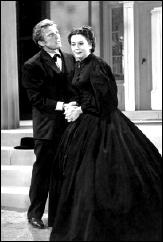Sat 31 Mar 2012
GREEK DRAMA at the Movies, by Dan Stumpf.
Posted by Steve under Films: Drama/Romance , Reviews[11] Comments
I recently watched a series of films in a free association mode, beginning with Iphigenia (1977). The movie was adapted from Euripides by the writer/director whose name is usually anglicized as Michael Cacoyannis, and if you’re not familiar with the play, it deals with the agonies of Agamemnon, whose Troy-bound armies get bottled up in Greece when the winds refuse to blow.

As the troops grow restive and mutinous, an oracle tells Agamemnon he must sacrifice his daughter Iphigenia if he wants to appease the gods and get moving. How Agamemnon deals with the conflict, and at what personal expense, forms a telling drama.
Most of the actors’ names would mean little to you, but there’s a vulnerable and heart-breaking heroine, a convincingly conflicted Agamemnon, and Irene Papas as Clytemnestra (Agamemnon’s wife and Iphigenia’s mother) brings new dimensions to outrage and bitterness.
So after this I had to watch Helen of Troy (1956), producer/director Robert Wise’s super-spectacle on the Trojan War, and a hard film to beat if you like simple-minded action, lavish production, and lots of skin.

Faced with a script that allowed little or no character development; Wise compensate by creative casting: Robert Douglas, the villain of a dozen swashbucklers, plays a crafty Agamemnon, and as soon as he comes on screen, you know all you need to know about the character.
Likewise Stanley Baker’s tough-guy Achilles, Harry Andrews’ lantern-jawed Hector, Sir Cedric Hardwicke as stately Priam and Torin Thatcher as a scheming Ulysses. One actor puzzled me though: Ronald Lewis playing Aeneas seemed terribly familiar, but I couldn’t quite place where I’d seen him. A bit of research revealed why he seemed so familiar; yet unrecognized – he was Mr. Sardonicus.

And after that, of course, I had to finish Agamemnon’s saga with Electra (1962), Cacoyannis again adapting Euripides, this time the story of Agamemnon’s return home, his murder by Clytemnestra, and the vengeance of his daughter Electra — played with steely resolve by Irene Papas, who played Clytemnestra fifteen years later in Iphigenia.
Where Helen was sheer spectacle, painted with a wide-and-brightly-colored palette, Electra and Iphigenia are pure Drama, done mostly outdoors without sets, and they achieve a simple intensity that struck me as remarkable.
If (like me) you languished in the doldrums of Greek Drama in school, you might do well to take a look at these. They are, in every sense, an awakening.
So after that, of course, I had to watch Mourning Becomes Electra, Dudley Nichols 1947 adaptation of Eugene O’Neill’s take on the play. In his time, Nichols authored some memorable screenplays (including Stagecoach) but what he was doing here quite escapes me. Admittedly O’Neill can be heavy going, but I can’t think why Nichols apparently told his cast to emote like a troupe of performing seals.

No one who has seen Rosalind Russell in His Girl Friday would even recognize her lip-writhing, eye-rolling histrionics here. Or if they did, perhaps they’d just politely look away.
IPHIGENIA. Greek Film Center, 1977. Original title: Ifigeneia. Irene Papas (as Eirini Papa), Kostas Kazakos, Kostas Karras, Tatiana Papamoschou, Christos Tsagas, Panos Mihalopoulos. Director: Michael Cacoyannis (as Mihalis Kakogiannis).
HELEN OF TROY. Warner Brothers, 1956. Rossana Podestà , Jacques Sernas, Cedric Hardwicke, Stanley Baker, Niall MacGinnis, Nora Swinburne, Robert Douglas, Torin Thatcher, Harry Andrews. Director: Robert Wise.
ELECTRA. Finos Film, 1962. Original title: Ilektra. Irene Papas, Giannis Fertis, Aleka Katselli, Manos Katrakis, Notis Peryalis, Theodoros Dimitriou. Director: Michael Cacoyannis (as Mihalis Kakogiannis).
MOURNING BECOMES ELECTRA. RKO Radio Pictures, 1947. Rosalind Russell, Michael Redgrave, Raymond Massey, Katina Paxinou, Leo Genn, Kirk Douglas, Nancy Coleman, Henry Hull, Sara Allgood, Thurston Hall. Based on the play by Eugene O’Neill. Screenwriter/director: Dudley Nichols.
March 31st, 2012 at 7:48 pm
Glad to see I’m not the only fan of Helen of Troy. They don’t make ’em like that anymore. I always like the Greek dramas in school, so I made my students suffer through them for many years in the hopes that they’d like them, too. I probably didn’t convert many of them. I’ve seen Iphigenia, though not Electra.
March 31st, 2012 at 8:01 pm
I’m sure it was worth the effort, Bill, but Greek drama would have been a Tough Sell for me, too, back when I was in school.
Today, though? Dan makes them sound tempting, that’s for sure.
March 31st, 2012 at 8:47 pm
I suspect that most kids today know Greek mythology and drama from CLASH OF THE TITANS and TROY. Probably not a lot different from my generation, who knew the classics from JASON AND THE ARGONAUTS and the Hercules movies.
March 31st, 2012 at 9:15 pm
Dan:
I don’t believe you can give credit to a director for more than an intelligent, attractive presentation. If someone is effective, that person should get the credit. Likewise, if someone is off the charts, that person takes the blame. Russell and Dudley Nichols were together on Sister Kenny as well. Add The Velvet Touch and you have Rosalind Russell at the beginning of her “great” actress period. Too bad, because before that she was just fine, at least most of the time.
March 31st, 2012 at 10:38 pm
Also Nichols was almost as big a disaster in his few directorial efforts, as he was successful in his screenwriting career. A flat out neat and disciplined writer. Great with the little things. The other way behind the camera.
April 1st, 2012 at 12:54 am
I’m going to assume, unless someone tells me otherwise, that starting with HELEN OF TROY might be the easiest way to ease into Greek drama by way of these four films.
I don’t know how I know the story so well. I never saw the book and I certainly never read the book. Maybe it was the Classics Illustrated comic book.
April 1st, 2012 at 5:16 am
I saw a really corking stage production of Sophocles’ OEDIPUS THE KING and OEDIPUS AT COLONUS way back in the late 80s, with David Threlfall and Eleanor Bron. It led me to think that Greek drama works best on stage rather than on the screen. Go on location and there are far too many visual distractions, and the actors and the text are really the thing. A few years back my wife and I watched TROY in a practically empty theatre and nearly fell out of our chairs laughing. The film looked beautiful but the dialogue was so unintentionally hilarious that it felt more like CARRY ON AGAMEMNON.
HELEN: You should not have come here tonight.
PARIS: That’s not what you said last night.
HELEN: Last night was a mistake.
PARIS: And the night before?
HELEN: I’ve made many mistakes this week.
April 1st, 2012 at 8:01 am
And yet Rosalind Russell was nominated for a Best Actress Oscar for ELECTRA and many were surprised she didn’t win.
April 1st, 2012 at 8:14 am
Sadly, with MOURNING BECOMES ELECTRA, you have to Something to distract the audience from the play. And I write as a great admirer of most of O’Neill’s work. But not that one.
But I was a big fan of the good translations of Sophocles as a kid, played Creon with enthusiasm in a reading once in theater class (and when my classroom group chose to do LONG DAY’S JOURNEY, we borrowed a large heart needle from my home-room guy, a biology teacher, which was an amusing if slightly disturbing prop…hypodermics in those days probably were pretty large). My then-new best friend had her one stage experience in a university production of LYSISTRATA (she then went on to give Letterman a bit of a hard time on one of his early episodes…in case Bill Crider or Ed Gorman are reading this).
Man, Papas was striking, to say the least. Nice to be reminded. I haven’t seen her in either of these in dog’s years. Very old dogs.
April 1st, 2012 at 8:15 am
And Bron helps most productions she’s in.
April 1st, 2012 at 8:47 am
Jeff:
Suppose Russell was nominated by people who thought along the same lines as she did. His Girl Friday was her film for awards.